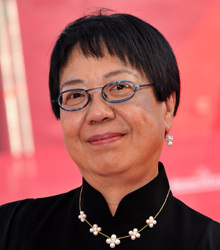| Director Honored
 |
|
(XINHUA) |
Hong Kong director Ann Hui was honored with a Lifetime Achievement Award at the Sixth Asian Film Awards on March 19. She became the first female director to receive the award from the Hong Kong International Film Festival Society.
Hui, 64, is famed for classics such as Song of the Exile and her most recent work A Simple Life, which has received worldwide acclaim for her tale about the relationship between a young Hong Kong man and the servant who raised him.
Born in northeast China's Liaoning Province, Hui lived in Macao until she was 5 and then moved with her family to Hong Kong.
Cyber attacks on China launched from bases overseas surged in 2011, rising to 8.9 million computers affected from 5 million in the previous year, according to a network security report.
Japan was the source of most attacks (22.8 percent), followed closely by the United States (20.4 percent) and the Republic of Korea (7.1 percent).
The report, released on March 19 by China's National Computer Network Emergency Response Technical Team and Coordination Center, found that 11,851 Internet protocol addresses based overseas took control of 10,593 Chinese websites last year.
Attacks included destroying servers, distorting website content and stealing personal data from Chinese Web users.
Overseas hackers altered the content of 1,116 Chinese websites, including 404 run by government agencies, said Wang Minghua, deputy director of the center's operation department, at a news conference on March 19.
The State Council, China's cabinet, on March 21 passed a five-year plan for improving drinking water supplies in rural areas. The Chinese Government will strive to solve problems concerning drinking water safety for 298 million rural residents in 2011-15, according to a statement issued by the State Council.
A total of 114,000 rural schools and nearly 80 percent of the rural population will have access to safe drinking water through centralized water supply facilities, according to the statement.
In the 2006-11 period, 105 billion yuan ($17 billion) was used to provide 210 million rural inhabitants with safe drinking water across China.
Noting the poor quality of potable water in the rural areas, local governments were urged to improve protection of water sources as well as strengthen the prevention and treatment of water pollution.
The Chinese Government has approved a plan to revitalize the economy of northeast China by 2015.
The northeastern region, once a leading industrial hub, will be built into an internationally competitive base for equipment manufacturing, raw materials and energy supplies, according to a statement from the National Development and Reform Commission, China's top economic planning body.
The region, which includes Heilongjiang, Jilin and Liaoning provinces, will also be built into an important base for agriculture and animal husbandry, according to the statement.
The government also aims to build the region into a key gateway between China and northeast Asia, the statement said.
China will create more rehabilitation service providers to meet rising demand, a health official said on March 21.
Ma Xiaowei, Vice Minister of Health, said that China will encourage qualified county, district and city hospitals to convert their facilities into rehabilitation centers.
China will also encourage private capital to enter the sector, leveling the playing field for private rehabilitation clinics in terms of market access and government regulation, Ma said.
China has 83 million handicapped people, as well as 270 million chronic disease patients and a growing elderly population.
Traditional Chinese medicine (TCM) has proven a cost-effective AIDS treatment that enhances patients' immunity and improves the quality of their lives, a five-year clinical trial has concluded.
A group of 10 practitioners have trekked through remote counties in southwest China's Sichuan Province since 2006, providing medicine to more than 300 AIDS patients who were enlisted as volunteers in a research program testing TCM treatment of the incurable disease.
"We have found, after years of research, that traditional herbal medicine proves the most effective in the latency period, and its intervention can effectively postpone the emergence of AIDS," said Zhang Yi, Vice President of the Sichuan Academy of Chinese Medicine Sciences, in an interview with Xinhua News Agency on March 20.
Such early-stage intervention, he suggested, could also enhance patients' immunity and ease their symptoms such as fatigue, susceptibility to cold and digestive disorders.
The Information Office of Shanghai and the Chief Development Office of Houston, the United States, signed the Memorandum of Exchange and Broadcast City Image Videos in Houston on March 22.
Under the agreement, Shanghai and Houston will broadcast each other's promotional videos on electronic screens in public places, TV and websites. The joint promotional activity will last for a period of six months based on the principle of reciprocity.
Shanghai also signed the Memorandum of Cross Promotion with Chicago on March 21. According to the new memorandum, the two cities will exchange and broadcast each other's videos on various multimedia channels including electronic screens and television media starting from May this year.
The number of registered users of Tianhe-1A, China's fastest supercomputer, has passed 300, according to the National Supercomputing Center in Tianjin.
Companies from the United States, Canada, Singapore and Sweden are among the users, according to a press release issued on March 20 by the center, where the supercomputer was installed.
It provides outsourcing services for complex work like mine surveying, bioinformatics, large-data animation design, nuclear fusion energy research and marine environmental engineering.
With a processing speed of 2.57 quadrillion operations per second, Tianhe-1A was ranked fastest in the world in November 2010, but was surpassed by the Japan-developed K Computer last June, according to the Top 500 list of the world's most powerful computers.
Tianhe-1A was developed at a cost of $72.3 million. | 